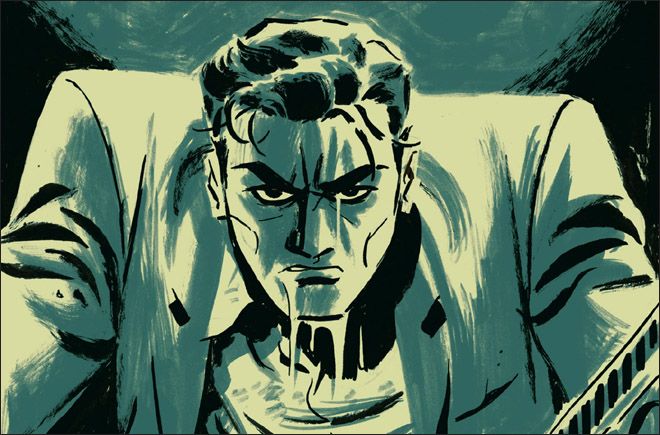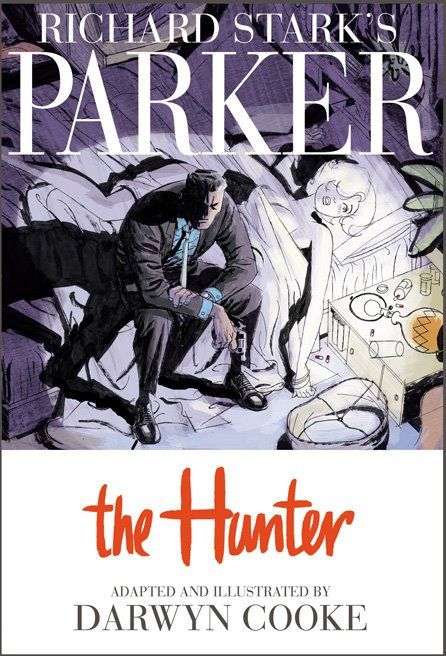Richard Stark's Parker Book One: The Hunter
Adapted and illustrated by Darwyn Cooke
IDW Publishing, 144 pages, $24.99.
While I've certainly always liked Darwyn Cooke's work, I can't say I ever loved it.
Don't get me wrong, there's no denying the man's talent or his dedication to the craft. But there's always been some hard-to-define barrier that prevented me from enjoying his work as much as others seem to.
It's hard for me to put a finger on what kept me from being fully engaged. Too much nostalgia for the past, both in terms of his Toth-like dynamism and forthright attitude towards superhero derring-do? Too slick and over-polished a style? Too mannered? Not enough grit and teeth? Whatever it was, I found myself being more of a distant admirer than a fan.
Now we have his latest work, Richard Stark's Parker: The Hunter. And while I may not be able to park myself in the Cooke fan camp yet, I think it's safe to say that with this stellar graphic novel, I'm steadily edging in that general direction.
It could easily have gone the other way. My biggest fear upon cracking this thing open was that, as with some of Cooke's DC work, he would be so reverential towards the source material that the book would come off as unnecessary at best and stiff and hollow at worst.
But it's none of those things. Quite the contrary, The Hunter snaps with life and menace, right from its bravura opening (note the way the narrow strip of introductory text on the opening page points like an arrow to Parker's clipped dialogue) to the final shoot-out. Far from being mannered or overly precious, Cooke's elegant style serves the story splendidly.
By now you probably know that Hunter is an adaptation of the first in crime novelist's Donald Westlake's series of Parker novels (which he wrote under the pseudonym of Richard Stark, hence the book's title). Apparently he was a popular character -- Hollywood made a pair of movies out of the book, one starring Lee Marvin, the other Mel Gibson. Godard even adapted another of the books in the series, though he took a few liberties.
The plot is about is simple as it gets, which is just how it should be in the crime genre. The more simple and direct your story, the more style and meaning you can squeeze out of it. Here, Parker has been double-crossed, left for dead and cheated out of his share of a not inconsiderable amount of money. His goal: Get his cash back and revenge himself upon those who betrayed him. And he's not going to let social graces and thug etiquette get in his way.
It's important to note that Parker is a rather amoral rogue -- a sociopath really -- who has no compunction about, say, shooting someone in the face simply in order to prove that he's not someone to be fucked with. He's not reckless, just cruel. Honestly, that's his appeal. Who among us hasn't fantasized, at least once in our lives, about being able to shrug off our empathy and aggressively pursue our own agenda without caring about who we hurt? Who hasn't wished they could always be seen as anything but vulnerable? There's a reason Parker has been played by Marvin and Gibson, two that embody machismo, or at least try to.
Yet it can be rather tricky to make the reader want to follow the adventures of such an unlikeable person. Cooke manages to keep the reader engrossed by hinting at the deep waters that run beneath Parker's still surface. Except for one or two significant sequences, Cooke keeps Parker in shadow or odd angles, so that we get the sense that we're only seeing part of the man. We become fascinated with Parker as a result and want to know more about him his inner world in addition to his outer conduct.
Hunter is stylish, yes, but it's far from shallow. More importantly, it doesn't feel like it's stuck in Westlake's shadow. It's an assured, exemplary book that stands on its own, and should only help cement Cooke's reputation further. Even among doubters like me.


